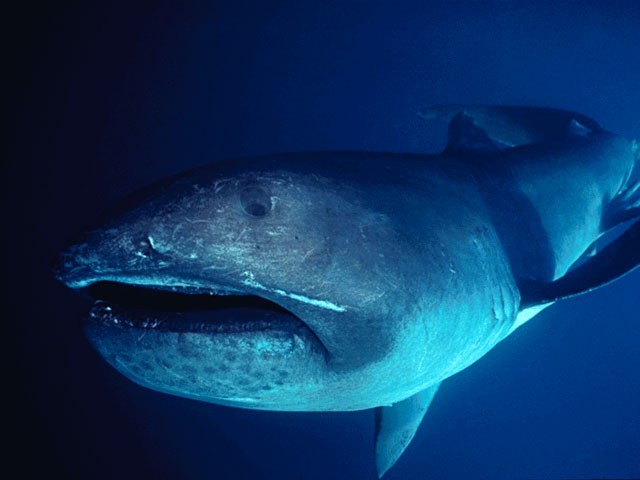|
| Query: Large white | Result: 856th of 2108 | |
Megamouth Shark (Megachasma pelagios) - Wiki
| Subject: | Megamouth Shark (Megachasma pelagios) - Wiki
| |

| Resolution: 640x480
File Size: 39203 Bytes
Upload Date: 2007:08:14 22:41:29
|
Megamouth shark
From Wikipedia, the free encyclopedia
[Photo] Megachasma pelagios. English: Megamouth shark. Plattd????tsch: Resenmuulhai Source http://rps.uvi.edu/VIMAS/Megamouth.jpg
The megamouth shark, Megachasma pelagios, is an extremely rare and unusual species of deepwater shark. Discovered in 1976, only a few have ever been seen, with 39 specimens known to have been caught or sighted as of 2007 and three recordings on film. Like the basking shark and whale shark, it is a filter feeder, and swims with its enormous mouth wide open, filtering water for plankton and jellyfish. It is distinctive for its large head with rubbery lips. It is so unlike any other type of shark that it is classified in its own family Megachasmidae, though it has been suggested that it may belong in the family Cetorhinidae of which the basking shark is currently the sole member.
Physical characteristics
Little is known about the megamouth. The appearance of the megamouth is distinctive.
Body
The megamouth has a generally brownish-blackish color on top and white underneath, and an asymmetrical tail with a long upper lobe, similar to the thresher shark. The interior of its gill slits are lined with finger-like gill rakers that capture its food. A relatively poor swimmer, the megamouth has a soft, flabby body and lacks keels.
Size
Megamouths are very large sharks, growing to at least 5.5 m (18 ft) in length. Males mature by 4 m (13 ft) and females by 5 m (16 ft). Weights of up to 1,215 kg (2,679 lb) have been reported.
Mouth
Megamouth has a large mouth with small teeth, and a broad, rounded snout, causing observers to occasionally mistake megamouth for a young orca. Megamouth has luminous organs called photophores around its mouth. It is believed they may exist to lure plankton or small fish into its mouth.
Reproduction
Reproduction is ovoviviparous.
Discovery
The first megamouth was captured on November 15, 1976 about 25 miles off the coast from Kaneohe, Hawaii when it became entangled in the sea anchor of a United States Navy ship. Examination of the 4.5 m (14.6 ft), 750 kg (1,650 lb) specimen by Leighton Taylor showed it to be an entirely unknown type of shark, rivaling the coelacanth as the most sensational discovery in ichthyology during the 20th century.
Hoax
The long delay between initial discovery (1976) and the scientific description (1983) became the focus of an elaborate practical joke by two friends of Leighton Taylor, Richard Ellis of the American Museum of Natural History and John McCosker, director of San Francisco's Steinhart Aquarium. Ellis and McCosker photocopied random articles from Japanese scientific journals and inserted photographs of the megamouth shark and a map of the type location and an English abstract, making it appear as if a Japanese team under guidance of John E. Randall of the Bishop Museum was to snatch the scientific merits of the description right from under Taylor's nose. An accomplice in Japan then mailed the "preprints" to Taylor, who was naturally dumbstruck. He then had his Japanese-American secretary translate the "paper", only to be told that it contained things like musings about the cat in Japanese art, and rhinoceroses in Ueno Zoo, but nothing about the megamouth shark. Hidden on the last page were the names of Ellis and McCosker, put there deliberately for Taylor to find them. Realizing he had been had, Taylor finally wrote up the description. The remark on its last page, "Particular thanks go to Richard Ellis and John McCosker for preparation of a preliminary manuscript which was of great help in the production of this final paper," is in reference to this incident.
Known specimens
In the 30 years since its discovery, as of May 2007 only 39 megamouth specimens have been caught or sighted. They have been found in the Pacific, Atlantic and Indian oceans. At least ten specimens have been found in the vicinity of Japan, more than any other single area. Specimens have also been pulled from the waters near Hawaii, California, Taiwan, the Philippines, Indonesia, Australia, South Africa, Brazil, Senegal and Ecuador.
http://en.wikipedia.org/wiki/Megamouth_shark
| The text in this page is based on the copyrighted Wikipedia article shown in above URL. It is used under the GNU Free Documentation License. You may redistribute it, verbatim or modified, providing that you comply with the terms of the GFDL. |
|
Comments |
|---|
| | Guest |
|
큰주디상어 (갱상도판 번역)
큰주둥이상어?????????????????????????? |
| | Guest |
|
| thats a big fucken mouth |
^o^
Animal Pictures Archive for smart phones
^o^
|
|
|